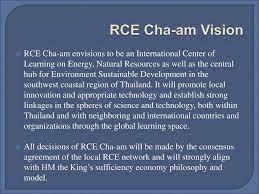
https://www.rcenetwork.org/portal/international-conference-environment-c...
https://www.rcenetwork.org/portal/sites/default/files/Conference%20Progr...
The deadline for registrations is 19 June 2023.
RCE Cha-am envisions to be an International Center of Learning on Energy, Natural Resources as well as the central hub for Environment Sustainable Development in the southwest coastal region of Thailand. It will promote local innovation and appropriate technology and establish strong linkages in the spheres of science and technology, both within Thailand and with neighboring and international countries and organizations through the global learning space.
GOALS OF THE RCE CHA-am
The majority of people in the two provinces have a similar understanding of “Sustainability”
Development decisions are made which protect the natural ecosystem of the coastal and highland areas and are in-line with the King’s “sufficiency economy model”
Restoration of the coastal mangrove ecosystem to a sustainable state
About RCE Network
RCE VISION AND MISSION
In 2002, the UN General Assembly adopted a resolution announcing the Decade of Education for Sustainable Development (UNDESD 2005-2014), based on the Johannesburg Plan of Implementation. The United Nations Scientific and Cultural Organization (UNESCO), the lead agency for the UNDESD, stressed the need to reorient existing education towards sustainability.
In 2003, in response to the UN resolution on the UNDESD, the United Nations University Institute for the Advanced Study of Sustainability (UNU-IAS) launched the ESD project, with funding support from the Ministry of the Environment, Japan. The ESD project designs and implements research and development activities through two flagship initiatives: a global multi-stakeholder network of Regional Centres of Expertise on ESD (RCEs) and a network of higher education institutions called the Promotion of Sustainability in Postgraduate Education and Research Network (ProSPER.Net).
Moving forward, UNESCO has now presented the ESD for 2030 Roadmap with its five priority areas of action: advancing policy, transforming learning environments, building capacities of educators, empowering and mobilizing youth, and accelerating local level actions. At all levels of society, RCEs play a crucial role in implementing these goals using their local knowledge and global network.
As of January 2023, 188 RCEs have officially been acknowledged by the United Nations University worldwide. The Global RCE Service Centre is headquartered at UNU-IAS, where it provides assistance to individual RCEs and facilitates their communication and networking.
RCE Vision
RCEs aspire to translate global objectives into the context of the local communities in which they operate. Upon the completion of the DESD in 2014, RCEs are committed to further generating, accelerating and mainstreaming ESD by implementing the ESD for 2030 Roadmap, and contributing to the realization of the Sustainable Development Goals (SDGs).
RCE Mission
The planet faces a number of sustainability challenges, from climate change and the rapid extinction of species to the necessary modification of our consumption patterns. International platforms exist to tackle each of these issues: the United Nations Framework Convention on Climate Change (UNFCCC) mission is to reduce greenhouse gas emissions globally, keeping in mind action need to happen at the local level; the 10 Year Framework Programme on Sustainable Consumption and Production (10YFP on SCP) which is examining ways how consumer behaviour and industrial production patterns can shift towards a more sustainable use of the planet’s resources; and the Convention on Biological Diversity (CBD) as well as the Intergovernmental Platform on Biodiversity and Ecosystem Services (IPBES), both platforms bring scientists and policy makers together in a mission to protect the world’s biota.










Add new comment